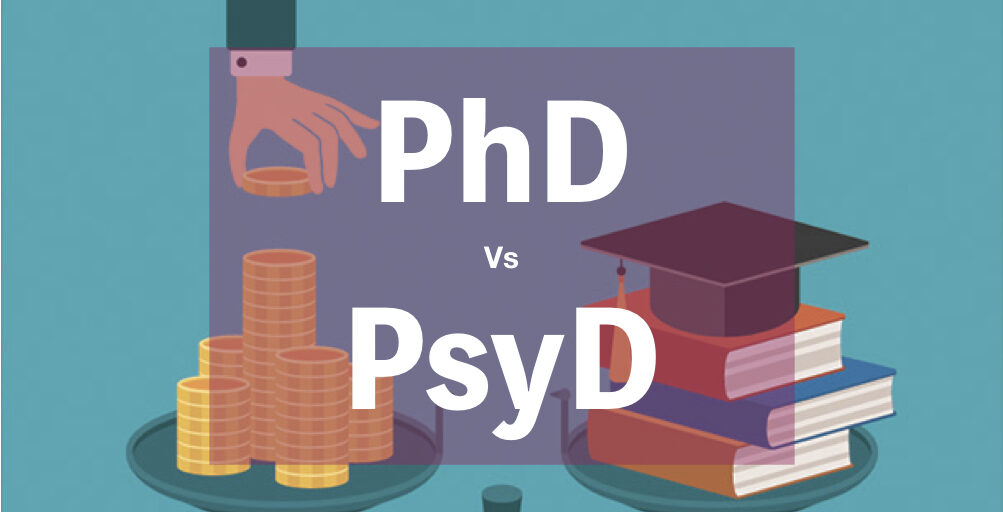The PhD is referred to as a doctor of philosophy, a higher level of academic degree in any disciplines of study such as arts, commerce or science.
The PsyD is referred to as a doctor of psychology given specifically in the field of psychology or related interdisciplinary.
In any of the academic system, the PhD is the highest level of honour given to the students for providing knowledge or information in their respective filed. Their responsibilities are to do research to find a new horizon of knowledge in their field.
On the other side, the PsyD is also a doctoral degree but the major focus will be on clinical and therapeutic applications.
Anyone with the master degree can get a PhD in their field, but here we are talking about the psychology hence we will only discuss, how PhD (in psychology) is different from the PsyD. Further to this, are there any similarities between both?
Let’s check it out.
According to the American Psychological Association, “the scientific study of mind and behaviour is referred to as Psychology.” The study includes the behaviour of a person, brain function, mental process, cognitive processes and related clinical applications.
Several sub-disciplines of psychology are clinical psychology, social psychology, quantitative psychology, behavioural neuroscience, cognitive psychology, developmental psychology and decision and intellectual psychology.
A student with a bachelor degree in general psychology can apply for master degree in any of the branch of psychology even, he or she can apply for PhD or PsyD as well.
More read: How long does it take to get a PhD?
PhD (in psychology) vs PsyD:
As we said earlier, the PhD is known as the doctor of philosophy and the PsyD is known as a doctor of psychology.
The strong focus of PhD in psychology is on research and academics while the strong focus of the Psyd is on the clinical application of it.
As in PhD, one has to provide knowledge, the major emphasis of the PhD in psychology is on research, academics and practice for improving recent knowledge.
While in the PsyD or doctor of psychology, the major emphasize is on the clinical application of present knowledge- how to apply the present knowledge for the benefits of society, person or population.
Thus for persuing the PsyD, a candidate has to do an internship for at least one year in clinical psychology. Contrary, in the PhD, the internship program is not mandatory.
Instead, a candidate has to abandon academic responsibilities given by the organization or university.
Although, the process and the mode of doing research are almost the same in both, which we will discuss later.
Typically, less time duration is required to complete the PsyD. The PsyD degree can be completed within 4 to 6 years while a PhD degree can be completed within 5 to 7 years.
The aim of doing a PhD is to generate or provide new knowledge fairly through scientific research.
Whereas,
The aim of doing PsyD is to apply that knowledge for providing therapies and application in psychology.
Interestingly, the PhD degree in all disciplines is awarded since long, however, the PsyD was introduced during 1970, exclusively for serving individuals or group of individuals through therapies, processes or counselling.
One of the other important difference between both is the acceptance rate.
Because of the high competition and varieties of PhD programs are available for PhD in psychology, on an average, the acceptance rate for PhD in psychology is less- nearly 10 to 15%. On the other side, the average acceptance rate for PsyD is up to 40%.
“The acceptance rate is the rate at which the applications for present advertisement, job or position are accepted.”
Enrolling into PsyD is tougher than PhD perhaps, and henceforth the average application rate for PsyD is lower than PhD.
Doing research through PhD or PsyD, one should invest time and a lot of money. So financial aid must require in the form of funding, stipend or lecturership. The financial aid also vary greatly between both,
As we said the major focus of PhD is on research so more money is required and because of that the funding opportunities are higher in the PhD. Generally, the funding opportunities are less in Psyd.
In the career perspective, both have different significance.
With the PhD degree, a student can apply for a teaching position as well as in the research lab whereas with the PsyD one can become a counsellor, social worker or can open their own clinic. However, they can also do research as well as apply for the teaching positions.
Besides the differences, there are several similarities between both,
The admission process is almost same in PhD as well as PsyD in which the master degree in psychology is required in both the cases. Along with it, the candidate has to clear the entrance exam or interview and submit the recommendation letter to the university.
The specific research objectives within the tenure of the degree must be completed in both under the guidance of the expert supervisor (allotted by the university).
In addition to this, in either case, the state licence, as well as certification, must require to do clinical practice in the relevant field.
With either PhD or PsyD, a candidate can pursue their career in applied subjects of psychology such as clinical psychology, sports psychology, mental health or social psychology, forensic psychology.
However, the only difference is that the candidate with a PhD in psychology can not do the clinical practice.
Read more: Doing a part-time PhD- a good option or not.
Summary of the article:
| PhD in psychology | PsyD- doctor of psychology |
| Strong focus on research | Strong focus on clinical applications |
| The student has to do research and provide knowledge | The student has to practise existing knowledge to a person or population. |
| Tenure of degree- 6 to 8 years | Tenure of degree- 5 to 6 year |
| Financial aid provided | Fewer opportunities are available for financial aid. |
| Carrer option- research, teaching and academic | Career option- clinical psychology or can open their won clinic |
| The acceptance rate is lower (10 to 15%) | The acceptance rate is high (40 to 45%) |
Conclusively, I can say,
For those who want to achieve their career in research and wish to do academic work, PhD is the best option for them. Moreover, a person can select different applied subjects to master a specific skill in psychology.
For example, A student doing a PhD in forensic psychology has to do research on topics more involved in forensics.




